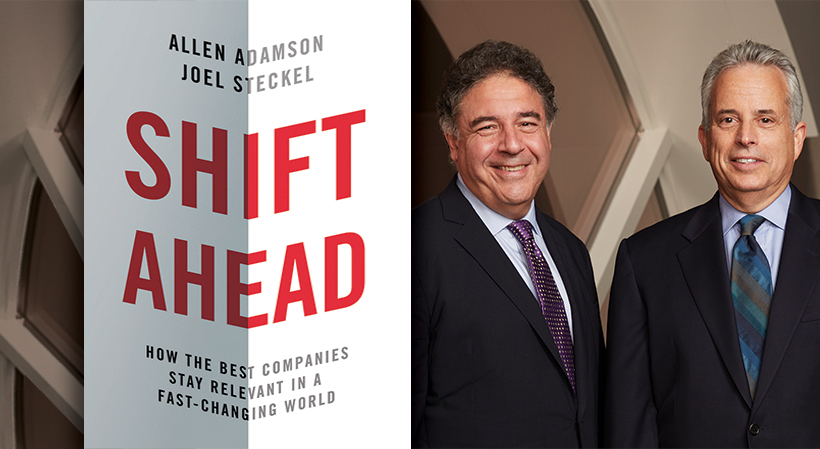The following is excerpted from “Shift Ahead: How the Best Companies Stay Relevant in a Fast-Changing World” by Allen Adamson and Joel Steckel © 2018 Allen Adamson and Joel Steckel. All rights reserved. Published by AMACOM Books. www.amacombooks.org Division of American Management Association 1601 Broadway, New York, NY 10019.
The difference between driving a manual transmission versus an automatic is a good analog for what happens in many businesses. To stay successful, to stay relevantly differentiated, a good organization stays attuned to the external conditions—all the things going on in the marketplace and the world that pose potential challenges and a potential need to shift. If you’re successful traveling along at 65 miles per hour, steady as you go, maybe you make a few minor adjustments to tweak performance or make things more comfortable. Maybe you update the product, redesign a logo to appeal to a younger audience, or speed up production to get out ahead of the competition. In general, the organization’s purpose and promise to its customers remain intact and what it stands for in the minds of consumers more or less remains the same. You’re on cruise control.
Think Verizon going from landlines to wireless. Think Apple going from computers to tablets and watches. These companies continue to deliver against the same customer promise. In fact, they actually strengthen the promise. They’re playing in the same lane, so to speak, and they have the organizational know-how to know how to do the same thing, only better, more robustly.
But what if simply changing gears to deliver on the same promise, perhaps in an enhanced way, is no longer the answer? What if it’s not a matter of expediting a marketing campaign in light of current events, or changing up your inventory, or tweaking the latest model of whatever it is you manufacture? What if the road you’re on is simply the wrong road all together? It might be that your promise is just totally off-kilter in the new world order and you have to rethink your value proposition. It might be that you have to rethink your employee population—great people, but with skillsets that won’t take you where you need to go. Maybe it’s that you realize you need to formulate an entirely new customer promise to be relevant. What if you’ve come to the end of the road with your offering and it’s not a matter of shifting gears but shifting direction?
Related: Choosing Your Best Pathway to Purpose Through Entrepreneurship
Katz’s Delicatessen: Sometimes staying in park is the right gear
Sometimes the best shifts are the ones you don’t make. If you ask the customers at Katz’s Delicatessen in New York City, they’ll tell you, “Please don’t change a thing.” Personally, as long-standing customers, we agree. Their pastrami, sliced by the cantankerous guys behind the counter, is about as perfect as it can be. That said, the iconic restaurant that’s been serving customers for more than a century is shifting gears, just ever so slightly, so as to expand its business without diluting its authentic flavor.
How, exactly, does a veritable New York dining institution expand without losing what makes it special? Very carefully and very conscientiously, explained the restaurant’s “Top Dog,” Jake Dell, a proud alumnus of the NYU Stern School of Business. After 128 years on Manhattan’s Lower East Side, the restaurant, which is known for its mile-high pastrami sandwiches as well as its cameo appearance in the movie “When Harry Met Sally,” is in the process of opening a second location for the first time ever. It is also in the midst of figuring out how best to leverage technology to better share this quintessential New York deli experience.
Before we share the details about its shifting, we want to savor a taste of its history. The restaurant opened in 1888 as a small delicatessen called “Iceland Brothers” at a time when Jewish establishments dotted the neighborhood. Its name changed to “Iceland and Katz,” and then to Katz’s Delicatessen, after the Katz family bought out the Iceland family. Katz’s would later move across the street to its present-day location that today seats 300 people. Opening up a second location is a big deal for a business that is known as the restaurant equivalent of a time capsule. Everything’s the same as it’s ever been. The counter behind which those cantankerous guys—“cutters,” as they’re called—yell at each other as they slice the delicious pastrami and corned beef, the aromas of pickles and salami, hot dogs and onions, the neon signs and the mysterious “ticket system,” the clamoring throngs of hungry people, New York sanitation workers and Wall Street types freely mingling with each other and with the guide-toting tourists from around the world. It’s visual chaos that hits your every sense at once—sight, smell, and hearing.
So, again, think carefully about whether to shift, and how much to shift, and if you can execute before you start down the road. “While we’ve had several opportunities to branch out over the years,” Dell told us, “the family held off until we could figure out how to do it the right way. The history and tradition of this place—it’s the classics, what people come here for—the same food every time you come here. All that needs to be the same and not changed. That’s what makes this place so special in my mind. When we talk about the core of who we are, it’s the food and tradition, the nostalgia, and the atmosphere. We’re lucky compared to other businesses (because) not changing is actually what makes us popular, especially in the restaurant industry in New York City. That is rare, but that’s who we are.”
Dell and his family are attempting to replicate the quality of Katz’s food elsewhere, although not at a sit-down restaurant but at a stand at the DeKalb Market Hall in City Point, Brooklyn. “It’s in the old Albie Square Mall, near Fulton and Flatbush,” Dell explained. “Yes, it’s only a small takeout place, but we felt being a part of a vibrant community that’s loud and bustling, which this area [the Lower East Side] is, would be true to who we are. It’s the kind of environment we love. The Fulton neighborhood is very similar to our Delancey Street area. We know we’re never going to re-create the original place, but we want to make it easier for our regulars, who are finding it harder to get to Manhattan, as well as to be able to cater to the millennials in Brooklyn, a group that is keen on authentic experiences. It’s a way to bring the tradition and food just a little closer to people who already know who we are.”
That millennials are an Instagram-crazy bunch is also not lost on Dell, and a reason for another of the restaurant’s minor shifts in gear. After decades without any public relations, Dell actively embraces this social media, audience-activation app as a boon to his business. “I push for Instagram because it reinforces the original aspects of who we are. Any changes we undertake are specifically to reinforce who we are. Social media is good for our business. Instagram really conveys our authenticity to people, especially the sensory part of experience,” he told us. “We’re the third most Instagrammed restaurant in the country. Our place, our food, our employees, our customers provide great photo opportunities. It’s an easy way to grow the business while staying true to who we are. We’re balancing change by appropriately leveraging social media and technology to get the experience out to more people.”
Sign Up: Receive the StartupNation newsletter!
The shift in tactics to leverage technology is also making it possible to get more of the actual product out to homesick New Yorkers across the country. Without disturbing the “front of the house,” Dell’s back of the house operation is undertaking a strong push to ship nationally with packages delivered overnight directly to people’s doorsteps—some pastrami, a rye bread, some pickles, knishes, some mustard. While it can’t re-create the real restaurant experience at home, it’s still a delicious taste of home.
“The net takeaway for our success,” said Dell, “is that you need to stay true to who you are. I think a lot of businesses go under because they lose sight of that, and when they transfer from generation to generation, the next generation wants to change everything. For me, it’s a matter of respect the traditions—and respect the things that work. And, yes, you have to change, to adapt and grow, but if you do this while sticking to your core values and traditions, that’s what counts. If you’re going to make a change, do something different, you’d better be confident that it’s your best product and you’re putting your best foot forward.” Katz’s Delicatessen is a restaurant very much in touch with its DNA.
“Shift Ahead” is available now at fine booksellers and can be purchased via StartupNation.com.






